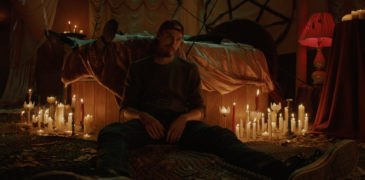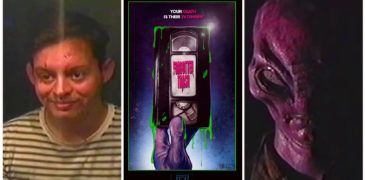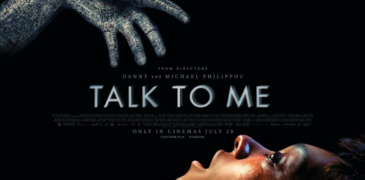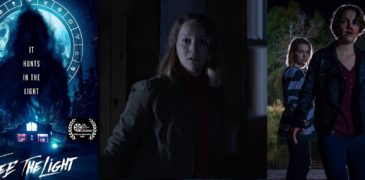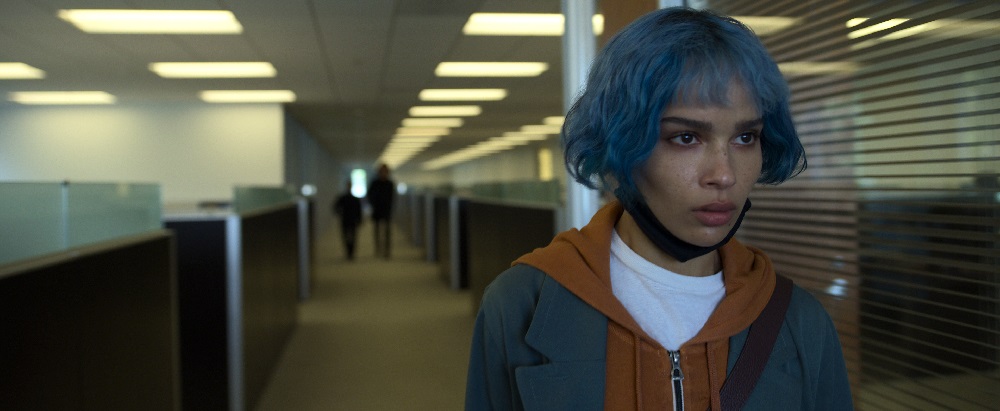
Exposure therapy is a psychological treatment used in helping patients with confronting and overcoming their fears. With KIMI, Steven Soderbergh’s mix of paranoid, domestic suspense and techno-thriller, the Academy Award-winning filmmaker has seemingly managed to do the impossible: identify and unite every source of modern fear while also providing a unique form of cinematic exposure therapy.
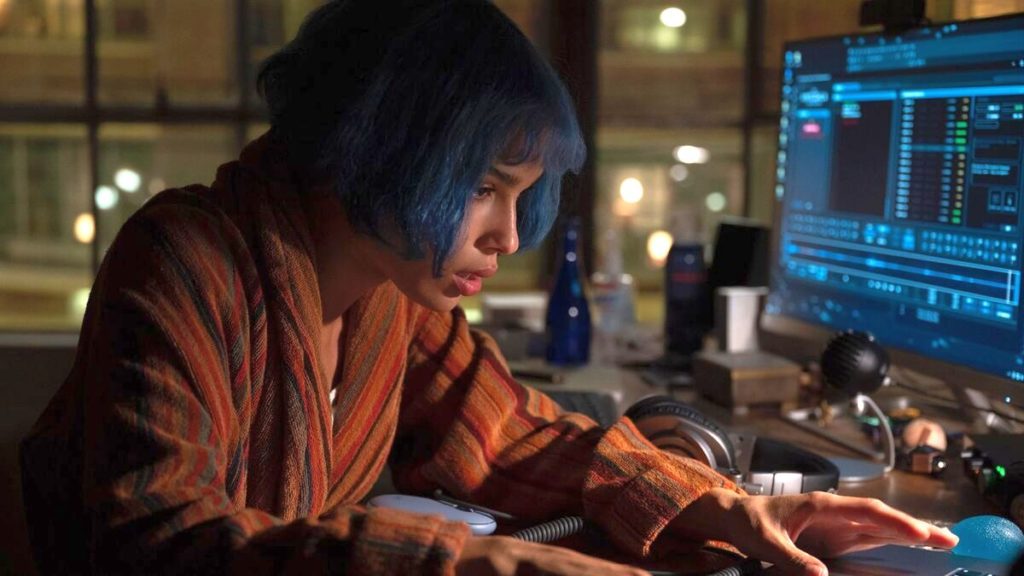
The movie’s plot sees Angela (Zoe Kravitz), an agoraphobic tech support engineer working from home for a company named Amygdala, fixing bugs and special issues that Kimi (the in-universe equivalent to Alexa) is yet unequipped to interpret and correctly handle. When she comes across a stream in which a possible crime has been recorded, Angela sets off to investigate, seeking help from the FBI and Amygdala’s big-wigs. However, the company is involved in a cover-up, and Angela must conquer her fears in a battle of wills which includes hackers, assassins and ominous phone conversations.
KIMI starts off by adhering to Soderbergh’s famous three-shot ‘rule’ (“After the first three shots, I know whether this person knows what they’re doing or they don’t”): the first shot shows a set of stairs and an immaculate lawn, while a voiceover explains the difference between Kimi and other products of its kind. The second shot reveals two luxury cars, the camera lingering on them while the voiceover discusses the importance of people to Kimi’s voice recognition technology. Finally, the third shot cuts to a close-up of Amygdala’s CEO, bathed in blue light and surrounded by books on electronics and CGI. Together, the three shots use color, perspective and monologue to set the tone and establish the basic fact that we live in a world dominated by big tech and its narrative. Just minutes later, in a twist similar to the opening of the recent microbudget indie Good Idea, it is revealed that the CEO is actually in his pajama pants and there is only one employee currently working from his office. The movie makes it painfully obvious that deception, misdirection and even ineptitude are huge parts of that narrative.
Angela is an extremely likeable character right from the start. Suffering from agoraphobia, OCD and COVID-induced anxiety, she is unable to leave the house, but manages to partially take control of her life and function from her headquarters which serve her every need. The only way to gaze at the world is through her apartment window: from there she notices a nosy neighbor, her love interest Terry and the hustle and flow of a neighborhood slowly recovering from COVID-imposed restrictions. Angela has to rely on, and even use other people in order to survive. She benefits from online psychological counseling, fixes some faulty wiring while receiving instructions on the phone and routinely consults with a Romanian hacker named Darius – who refers to her as “hotness”. At nights, she sometimes has Terry come over. In between her interactions, she scrubs and cleans, she obsesses over her work and her own limitations.
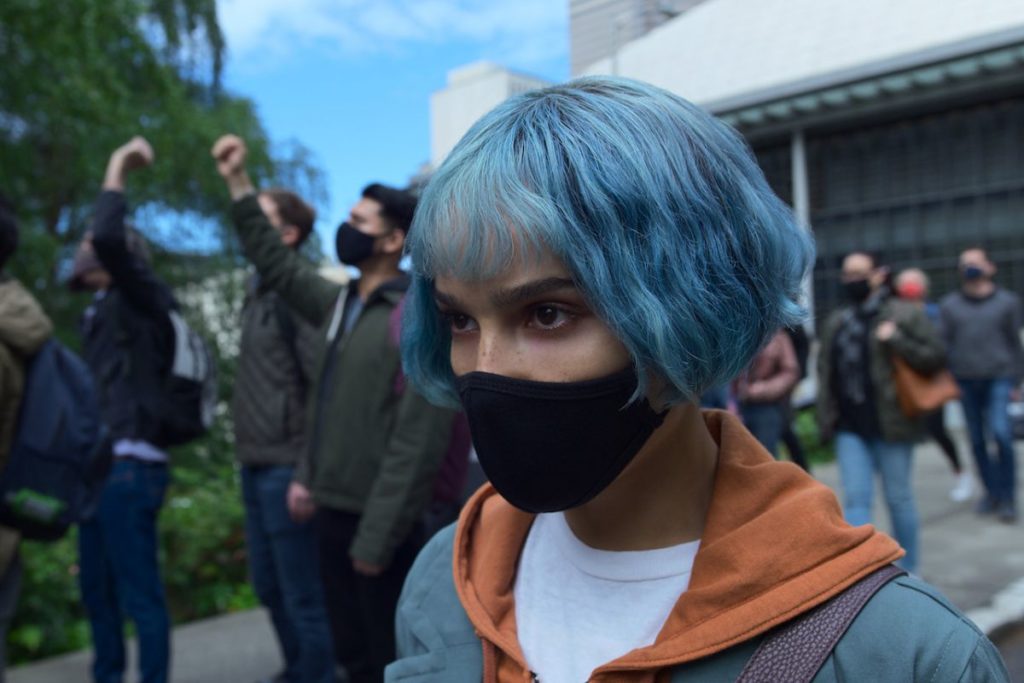
KIMI is a potboiler of modern fears, and Soderbergh makes it one of the scariest movies of the year by employing some of his best shots and angles ever in order to create an architecture of oppression. Low-angle shots, dutch-angles, extreme close-ups, top-down perspectives together with clever, lingering camerawork; all are used to accentuate Angela’s phobias as she is forced out of her comfort zone. Interestingly enough, Soderbergh doesn’t seem to differentiate when it comes to the bad guys, employing the same visual language he does with Angela – the only time he does something different is when introducing uber-hacker Yuri, via a rotating camera shot gradually revealing the amount of power he has at his fingertips.
Meanwhile, David Koepp’s script uses the coronavirus as backdrop and just seeing Zoe Kravitz wearing a black face-mask will be a powerful reminder to many. The virus is treated with seriousness, akin to Marc Munden’s recent Help, but the movie focuses on the reality of living with it rather than on the early days of the pandemic. This reality also has big tech controlling every level of educated society and seems “fake”, dystopian, almost like the one depicted in Adam Curtis’s HyperNormalization. The virus is in the air, on clothes, on sheets, on surfaces, while citizens like Angela are subjected to mass surveillance via home appliances and web applications. Privacy violations are the norm. Like in the Kate Dickie-starring Red Road, there is always the possibility of someone watching, or listening in on your conversations. However, one conversation in particular, the one sparked by #metoo, doesn’t seem to have had much effect on reducing workplace and domestic abuse, or the language used by men (Darius, in thick Russian accent and drinking vodka, casually mentions that #metoo is 50 years away from countries like Romania).
At one point, Angela recalls the horrors of Facebook moderation, which Clickbait also touched upon. Menacing uniformed officers wearing black masks patrol the streets. The terror shifts from psychological to the one masterfully underlined by AJJ’s lyrics in Body-Terror Song:
I’m so sorry that you have to have a body/ So very sorry that you have to have a body, oh yeah/ I’m sorry that you have to have a body/ Filled with infection/ One hundred scabs/ Singing in unison/ Eyes and hands
Anyone can be kidnapped in broad daylight, in the midst of impassive or puzzled onlookers. The society’s dissatisfaction erupts in violent demonstrations similar to those depicted in the movie Beckett. Above all, there is always the systematic abuse, the rule-breaking and the incompetence of tech utopians that Adam McKay’s Don’t Look Up skillfully portrayed (and nonetheless ended up dividing the audience). However, the movie doesn’t waste a good opportunity to inform viewers on how an abscess can kill them, either.
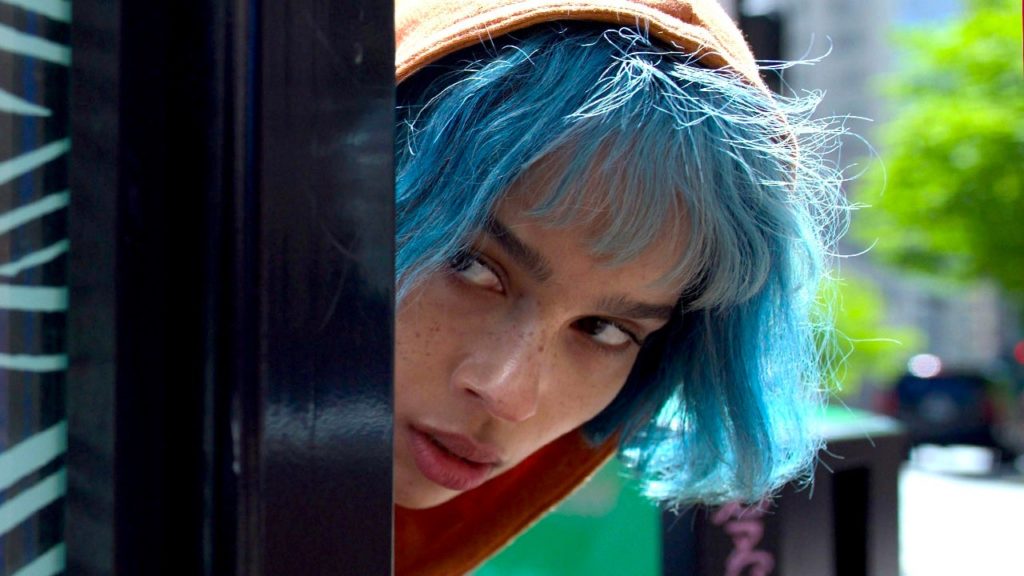
KIMI impresses not only by tapping into this intricate web of paranoia and imbuing every shot with utmost urgency, but by also by being extremely tech-savvy, like a spiritual sequel to Cory Doctorow’s Little Brother : Angela fixes Kimi’s bugs via a proprietary pattern-matching and ticketing system, a common tool used by software developers. When she has to isolate the background noise in a stream, she resorts to a software equalizer, but eventually brings out the big guns: sound-engineering filter hardware that she seems proficient at using, like a skilled DJ. Darius demonstrates how easy it is to hack devices just by knowing their hardware ids, while another hacker easily locates Angela via cellphone triangulation, even being able to turn her phone on and off remotely. None of this is ‘script-kiddie stuff’, like hacking a webcam, or a phone over public wi-fi – it’s Robert Redford, action-packed political-thriller territory. The people hunting Angela don’t work for cheap, they are deadly and ruthless, hiding in the shadows cast by CEOs and their backroom deals.
After a first act in which he mostly sets up the pieces on the board, Soderbergh creates a second act very similar in execution to Unsane. After Angela is forced to leave her home, she is menaced at every turn, with society functioning as a holding cell. Her possibly decaying mental health, coupled with the paranoia of her understanding the severity of her situation turn the movie into a nerve-wracking nail-biter. It is the third act which turns the movie on its head, by revisiting Angela’s apartment and effectively morphing into a smart-home version of Intruders. Koepp reveals his talent for comedy, with Angela being joined by a stalker who almost comes off as benevolent when compared to the rest of KIMI‘s unsavory characters. Soderbergh manages to unite all his players and concepts in a very satisfying, almost therapeutic manner. Angela possesses special skills, she is back in her bubble, and she is not alone: as she uses a nail-gun and demonstrates her knowledge of electronics, the movie almost slips into Wes Craven territory. However, Soderbergh maintains a clinical approach even throughout these final minutes.
Taking that into account, KIMI is not entirely without flaws: secondary characters simply appear and disappear, not making enough of an impact other than displaying a single character trait – with every blockbuster almost having to be 150 minutes long nowadays, some might wonder why Soderbergh didn’t allow himself more time to explore his secondary players. Darius, a Romanian hacker, employs every Russian stereotype, which might be grating to Romanian viewers. The straightforward manner in which the plot unfolds might seem telegraphed, too streamlined to the point of being perfunctory. Most of all, KIMI could be read as yet another Woman in the Window or Girl on the Train, and when Netflix releases a parody show targeting this woman-in-peril plot, it’s clear that the supply more than exceeds the demand. However, Soderbergh manages to revitalize the genre by injecting it with artistry and idiosyncracies – David Borwell’s essay is mandatory for fans looking for an in-depth analysis on how the movie differs from the thrillers mentioned above.
However, most of these flaws turn into qualities at a second glance: KIMI is a taut thriller, entirely without padding. Kravitz’s performance is a tour-de-force, demonstrating her character’s lack of control over big events that are about to unfold and the fact that fear can be both exhausting and exhilarating. The movie gradually expands, shifts and retracts. It functions both as an entertaining, empowering actioner and as a panic-attack inducing look at our technology-dominated lives. By tapping into a wellspring of fears, showing how technological advances can both save and destroy lives, and by refusing to be pigeonholed, Soderbergh possibly creates the most enjoyable thriller of 2022 so far, hitting the bullseye of the lockdown-cinema dart-board where most other directors have only managed to make holes in the wall.

More Film Reviews
Mean Spirited (2022) Film Review – Yes Today Satan
Andy, A wannabe YouTuber decides to head out and visit an old friend Bryce in an attempt to find out why he abandoned their prank channel, “Mean Spirited”, when he…
Forgotten Trash (2019) Film Review – Modern SOV Horror
When one thinks of Shot on Video (SOV) horror, a definitive time period tends to pop into the mind. That period from the 80s to the late 90s when SOV…
Talk to Me (2023) Film Review: Psychological Possession Packs a Punch
Ari Aster. Jordan Peele. Robert Eggers. These modern-day directors have transformed and elevated current horror trends by pouring clear passion, love, and vision into each film. Danny and Michael Philippou’s…
Birdemic 3: Sea Eagle (2022) Film Review – Have You Heard of Global Warming?
“A flock of sea eagles attack the coastal town of Santa Cruz, California. Why did the birds attack? Who will survive?” The Birdemic series has been a guilty pleasure of…
Subservience (2024) Film Review – Meet the other ‘Megan’ doll
Artificial intelligence, or AI, has been a popular trend amongst sci-fi horror films these days, from Lars Klevberg’s 2019 reboot of Child’s Play to the more recent Gerard Johnstone’s 2023…
Flee The Light Film Review (2021) – Atmospheric, Effective Witchcraft Horror
Flee the Light, the first feature film from Toronto-based production company Mythic Trips, is an indie mystical horror-thriller about two sisters who find themselves in the crosshairs of an ancient…
